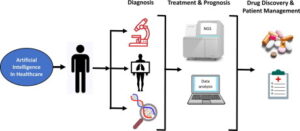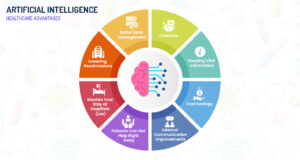The Future of AI in Healthcare

Artificial Intelligence (AI) is poised to transform healthcare in profound ways, bringing innovations that promise to enhance patient care, streamline operations, and accelerate research. The integration of AI technologies in healthcare is expected to lead to significant advancements across various domains, from diagnostics and personalized medicine to operational efficiency and drug discovery. As we look towards the future, it is essential to explore the potential benefits, challenges, and implications of AI in healthcare to fully understand its impact on the medical field.
Advancements in Diagnostics and Imaging
One of the most promising areas for AI in healthcare is diagnostics and medical imaging. AI algorithms, particularly those based on deep learning, have demonstrated remarkable capabilities in analyzing medical images such as X-rays, MRIs, and CT scans. These algorithms can detect patterns and anomalies with high accuracy, often surpassing human radiologists in identifying conditions such as tumors, fractures, and other abnormalities.
Looking ahead, AI is expected to further revolutionize diagnostics by integrating data from multiple sources, including medical images, genetic information, and patient histories. This integration will enable more comprehensive and accurate diagnostic tools, allowing for earlier detection of diseases and more precise treatment planning. Additionally, AI-driven diagnostic systems are likely to become more accessible, enabling remote and underserved areas to benefit from advanced diagnostic capabilities.
Personalized Medicine and Treatment
The future of AI in healthcare also holds great promise for personalized medicine. AI can analyze vast amounts of data to identify individual patient characteristics, including genetic, environmental, and lifestyle factors, that influence health and disease. This data-driven approach allows for the development of tailored treatment plans that are more effective and have fewer side effects compared to one-size-fits-all approaches.
AI is expected to play a crucial role in developing personalized treatment strategies by predicting patient responses to different therapies, optimizing drug dosages, and identifying the most appropriate interventions based on individual patient profiles. The integration of AI with genomics and other omics technologies will further enhance our ability to tailor treatments to the unique needs of each patient, leading to more effective and efficient healthcare.
Streamlining Healthcare Operations
AI has the potential to significantly improve healthcare operations by automating routine tasks and optimizing workflows. For example, AI-powered chatbots and virtual assistants can handle administrative tasks such as scheduling appointments, managing patient inquiries, and processing insurance claims. This automation can reduce the administrative burden on healthcare professionals, allowing them to focus more on direct patient care.
In addition, AI can enhance operational efficiency through predictive analytics and resource management. By analyzing historical data and predicting patient volumes, AI can help healthcare facilities better manage staffing, equipment usage, and patient flow. This improved operational efficiency can lead to reduced wait times, increased patient satisfaction, and overall better utilization of healthcare resources.
Drug Discovery and Development
The drug discovery and development process is traditionally lengthy and costly, often taking over a decade and billions of dollars to bring a new drug to market. AI is poised to accelerate this process by enhancing various stages of drug development, including target identification, lead optimization, and clinical trials.
AI algorithms can analyze vast datasets to identify potential drug targets and predict how different compounds will interact with these targets. This can lead to the discovery of new therapeutic candidates and more efficient optimization of existing drugs. Furthermore, AI can streamline the design of clinical trials by identifying suitable patient populations, predicting trial outcomes, and monitoring patient responses in real-time. These advancements are expected to reduce the time and cost associated with drug development, ultimately leading to faster access to new treatments.
Addressing Healthcare Disparities
One of the significant challenges in healthcare is addressing disparities in access to care and health outcomes. AI has the potential to either mitigate or exacerbate these disparities, depending on how it is implemented. On one hand, AI can improve access to quality care by enabling remote diagnostics, telemedicine, and virtual health consultations. This can be particularly beneficial for underserved and rural communities that may lack access to specialized medical services.
On the other hand, there is a risk that AI technologies could reinforce existing disparities if they are not designed and deployed with equity in mind. Ensuring that AI systems are trained on diverse datasets and are accessible to all healthcare providers is crucial for preventing the widening of health inequities. Policymakers, healthcare leaders, and technology developers must work together to ensure that AI advancements benefit all patients and do not inadvertently contribute to greater disparities.
Ethical and Regulatory Considerations
As AI becomes increasingly integrated into healthcare, ethical and regulatory considerations will play a critical role in shaping its future. Issues such as data privacy, algorithmic bias, transparency, and accountability will need to be addressed to ensure that AI is used responsibly and ethically. Developing robust regulatory frameworks and guidelines for the use of AI in healthcare will be essential for ensuring patient safety, protecting privacy, and maintaining public trust.
Furthermore, ongoing research and dialogue are needed to address the ethical implications of AI-driven decision-making, particularly in areas such as informed consent and patient autonomy. Ensuring that patients and healthcare providers have a clear understanding of how AI systems work and their potential impact on care will be vital for maintaining ethical standards and promoting responsible use of technology.
Conclusion
The future of AI in healthcare is both exciting and challenging, with the potential to revolutionize diagnostics, personalized medicine, and operational efficiency. As AI technologies continue to advance, they will offer new opportunities for improving patient care and accelerating medical research. However, it is crucial to address the ethical, regulatory, and equity concerns associated with AI to ensure that its benefits are realized in a responsible and equitable manner. By navigating these challenges thoughtfully, the healthcare industry can harness the power of AI to enhance outcomes and deliver better care for all patients.





